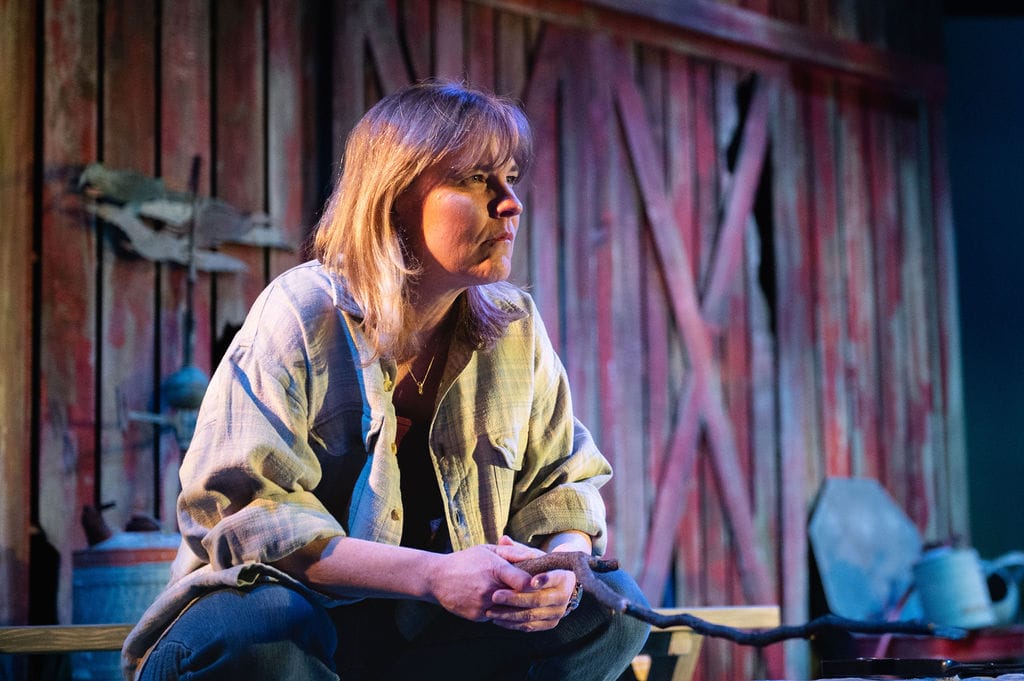'Nobody else is gonna tell my story:' 'Matilda' at Music Theatre Wichita
A strong cast, dazzling technical elements, and the rambunctious joy of children illuminate Roald Dahl’s dark musical. The regional premiere is on at Century II through Sunday.
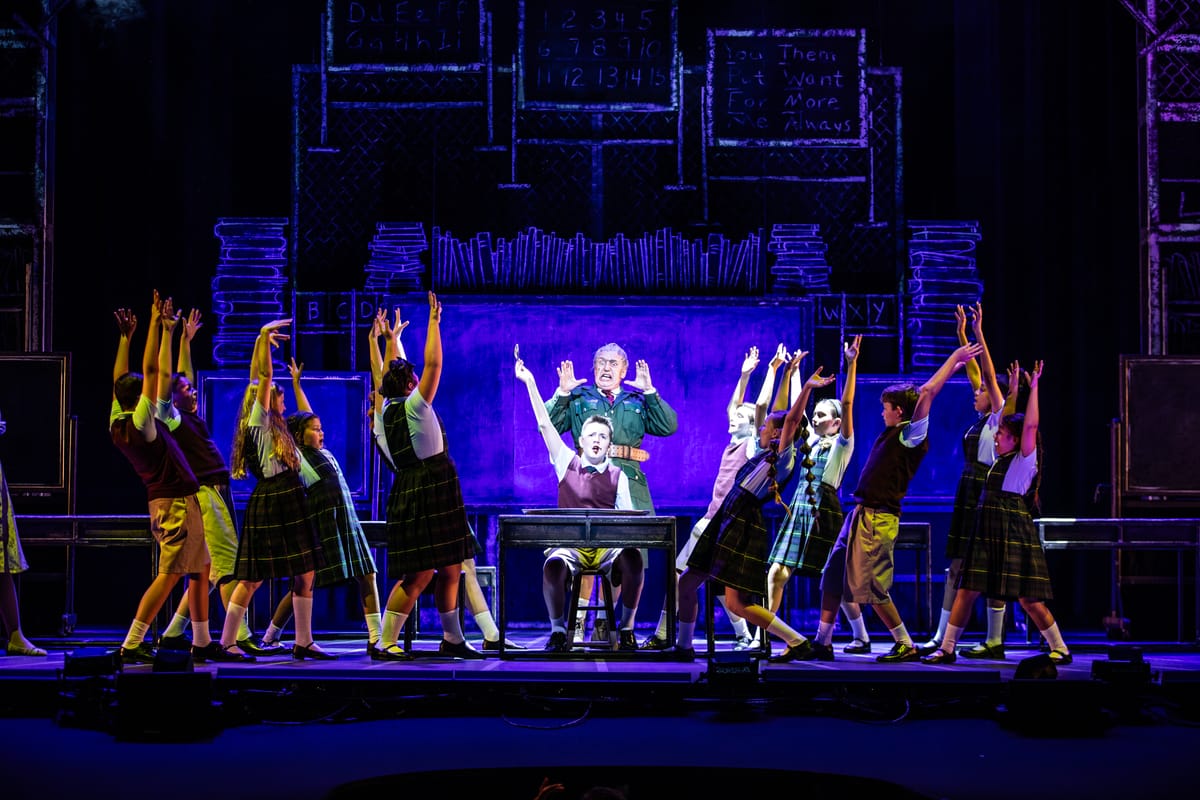
A muscular cast, wildly creative production values, assured direction and choreography, and — especially — the infectious joy of a crowd of kids conquer a musical that is difficult in more than one sense of the word. “Matilda,” adapted from Roald Dahl’s book by the same name, contains Gilbert-esque patter that speedily clicks along à la the opening numbers for “The Music Man” or “Hamilton.” Its witty but intricate lyrics can get lost when a chorus of kids, even talented ones, sing them — as they did in “Miracle,” the show’s opening number.
But more profoundly difficult in “Matilda” is its book — its off-kilter darkness, a mean quality that fans of Willy Wonka will recognize.
The story centers on a precocious little girl who loves to tell stories to an (enraptured) school librarian, specifically a long tale about an acrobat and an escapist who fall in love and desperately want a child. Matilda suffers over-the-top abuses at the hands of her family, the Wormwoods. Her mother would rather dance than be bothered by literally anything else. Her father hurls abusive language at her and is disgusted by her abnormally high intelligence. At school, tyrannical headmistress Miss Trunchbull terrifies her, her schoolmates, and her beloved teacher Miss Honey.
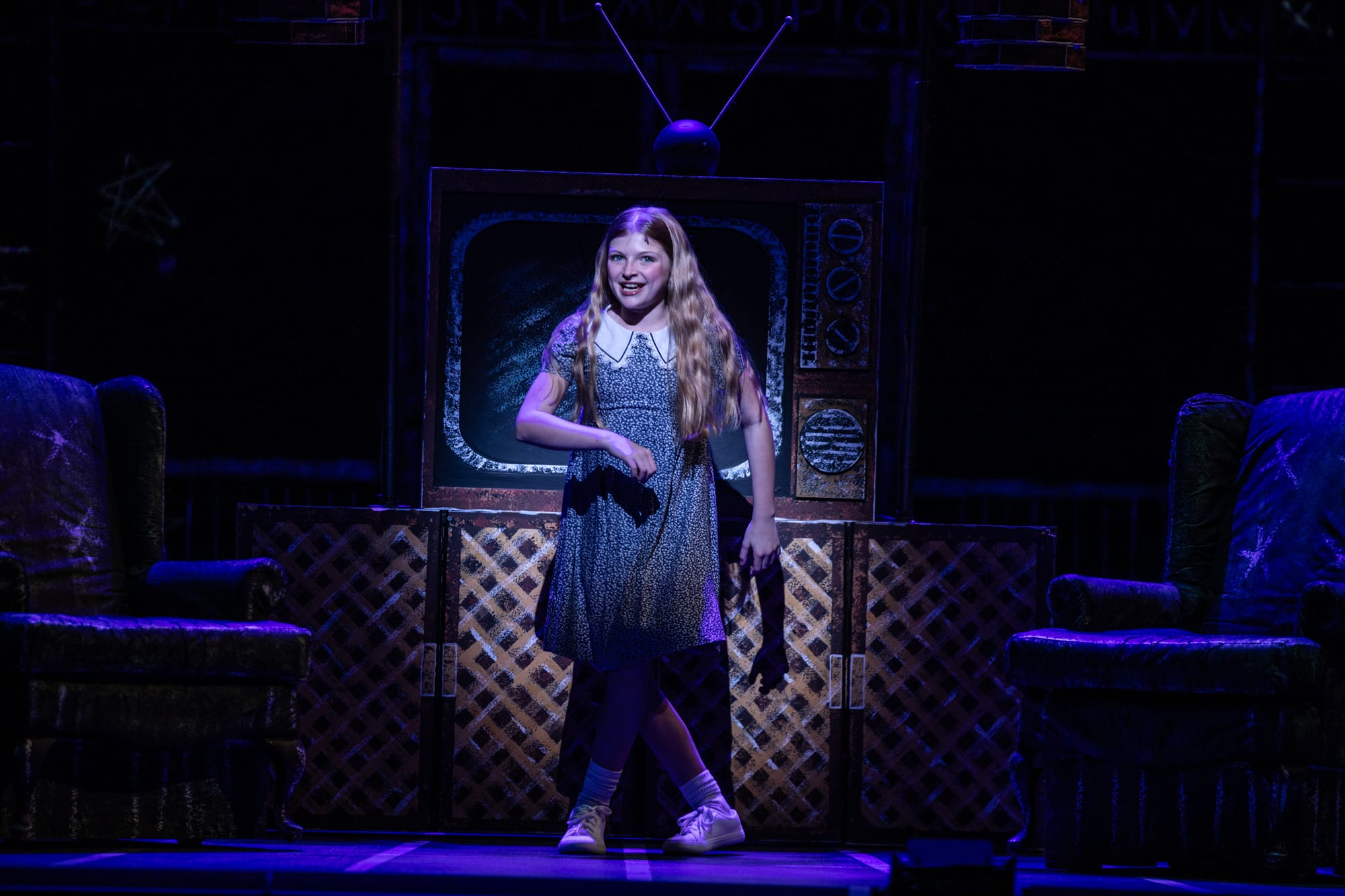
No shrinking violet, Matilda retaliates however she can, squeezing superglue into her father’s hat, protecting a student by outsmarting the headmistress. She inspires the other children to revolt, which leads to heightened sadistic punishment from Miss Trunchbull. Matilda’s fury — “It’s not fair!” she cries repeatedly — eventually boils over into a new power: telekinesis.
Many musicals skew dark, but they typically balance the muck with topical resonance or character pathos and a final, neatly-tied bow (even if it’s a dreadful one) — and they generally aren’t for and starring kids. “Matilda’s” monstrous villain is outrageously funny, and everything turns out swell thanks to a deus ex machina provided by ... the Bulgarian mafia?
And audiences — especially the kids — eat it up.
There’s plenty to feast on in Music Theatre Wichita’s production. Alongside less sure-footed performances, the ingenious use of lights and projections would steal the show. The musical’s set motifs are squares to resemble books, bookcases, shelves, alphabet blocks, and — figuratively — cages. In this production, these pieces are created with projections, appearing as letters, becoming fences, spelling names, disappearing again like stars at dawn.
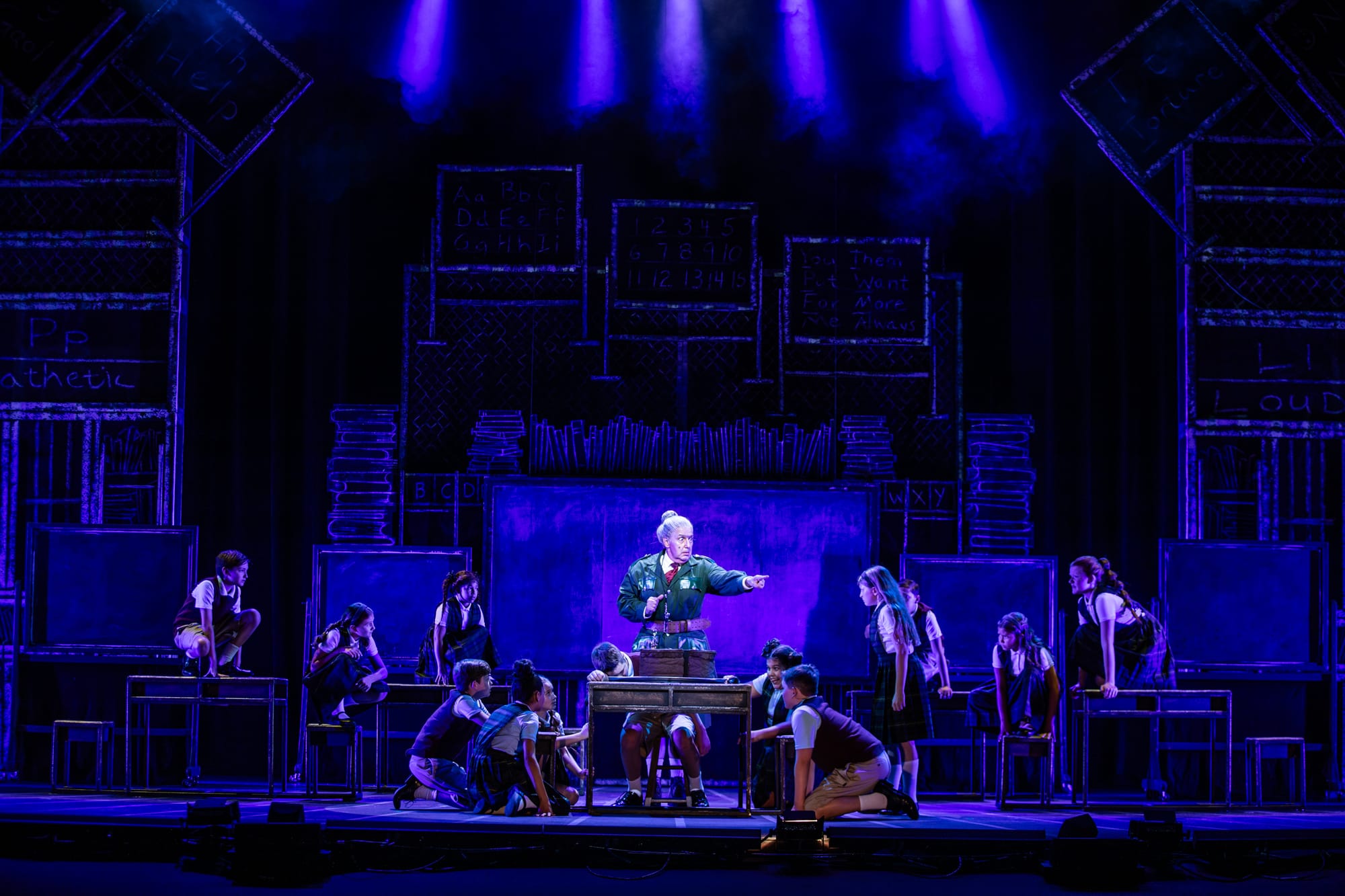
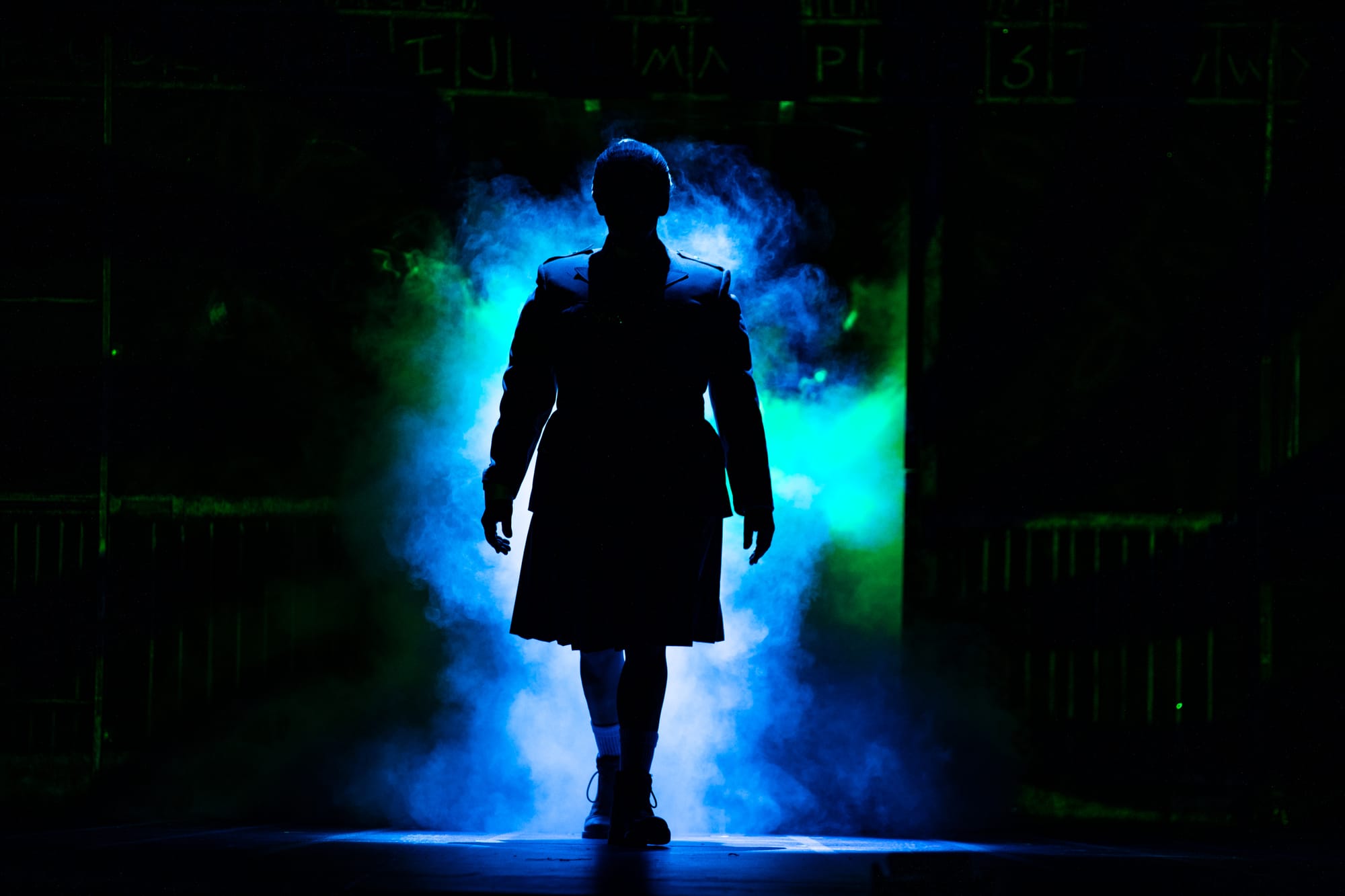
Effective use of lighting and projections help set the musical's menacing tone. Courtesy photos by Kacy Meinecke
In one dazzling scene, Miss Trunchbull swings a girl by her pigtails. (The realistic depictions of this and other cruelties underscores this production’s professionalism.) Impressive, yes; but then the girl becomes a projection hurled high into the air before landing again as the girl at the other side of the stage. In another, a boy’s enormous belch creates a cloud that drifts across the stage. Back lighting heightens the terror (ghoulish entrances by the headmistress) and softens the space (the safety of the library).
Significantly, beyond the stage effects, the cast brings it. Veteran David Lowenstein as Miss Trunchbull channels comic genius Peter Sellers at his most manic, squeaking and roaring in a fury that is both precise and overbearing, a bullhorn with physical prowess to match his razor-sharp verbal gifts. He sings “The Smell of Rebellion” during a vicious PE class in which he goes toe-to-toe with the kids in an Olympian gymnastic routine.
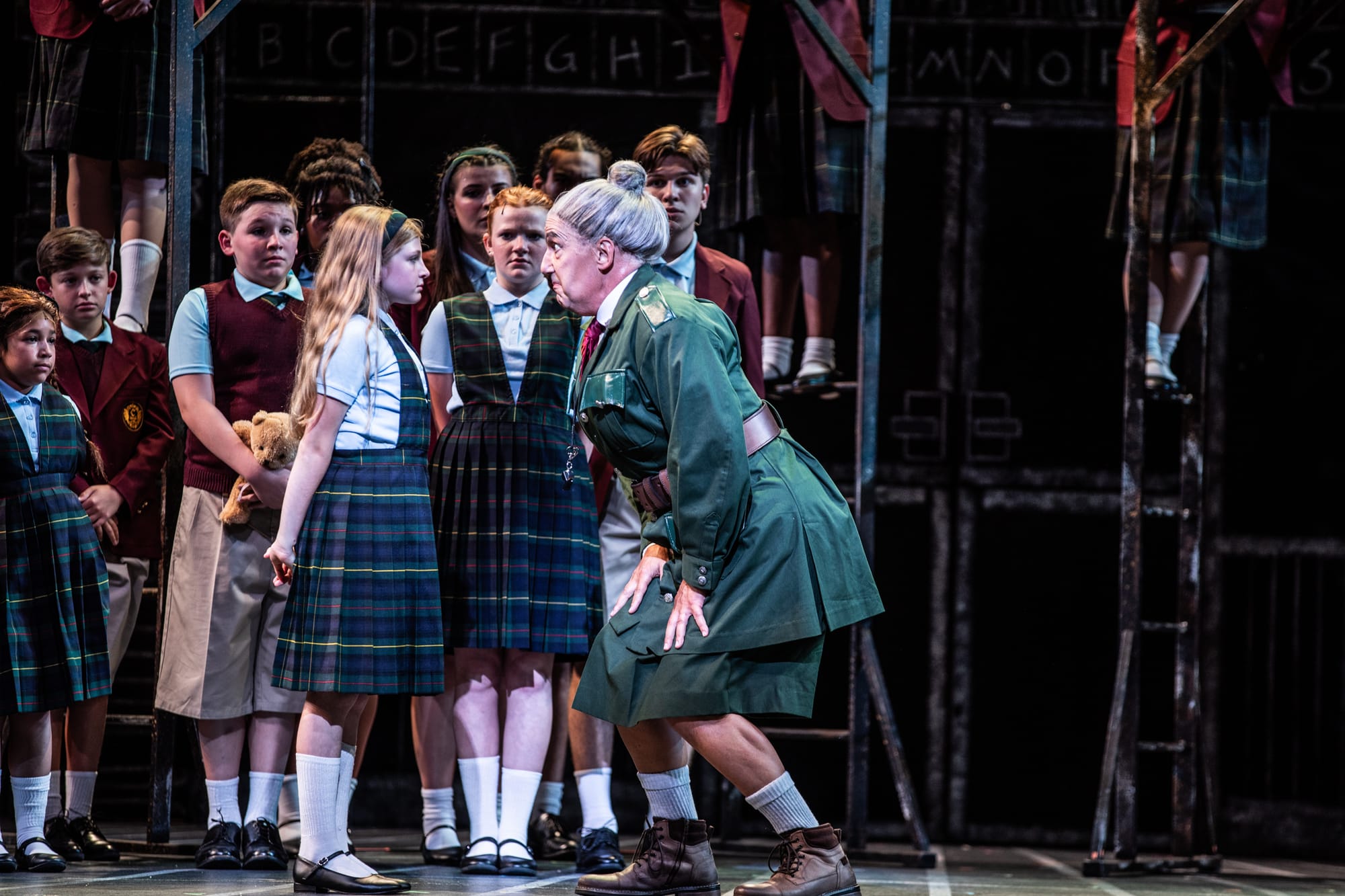
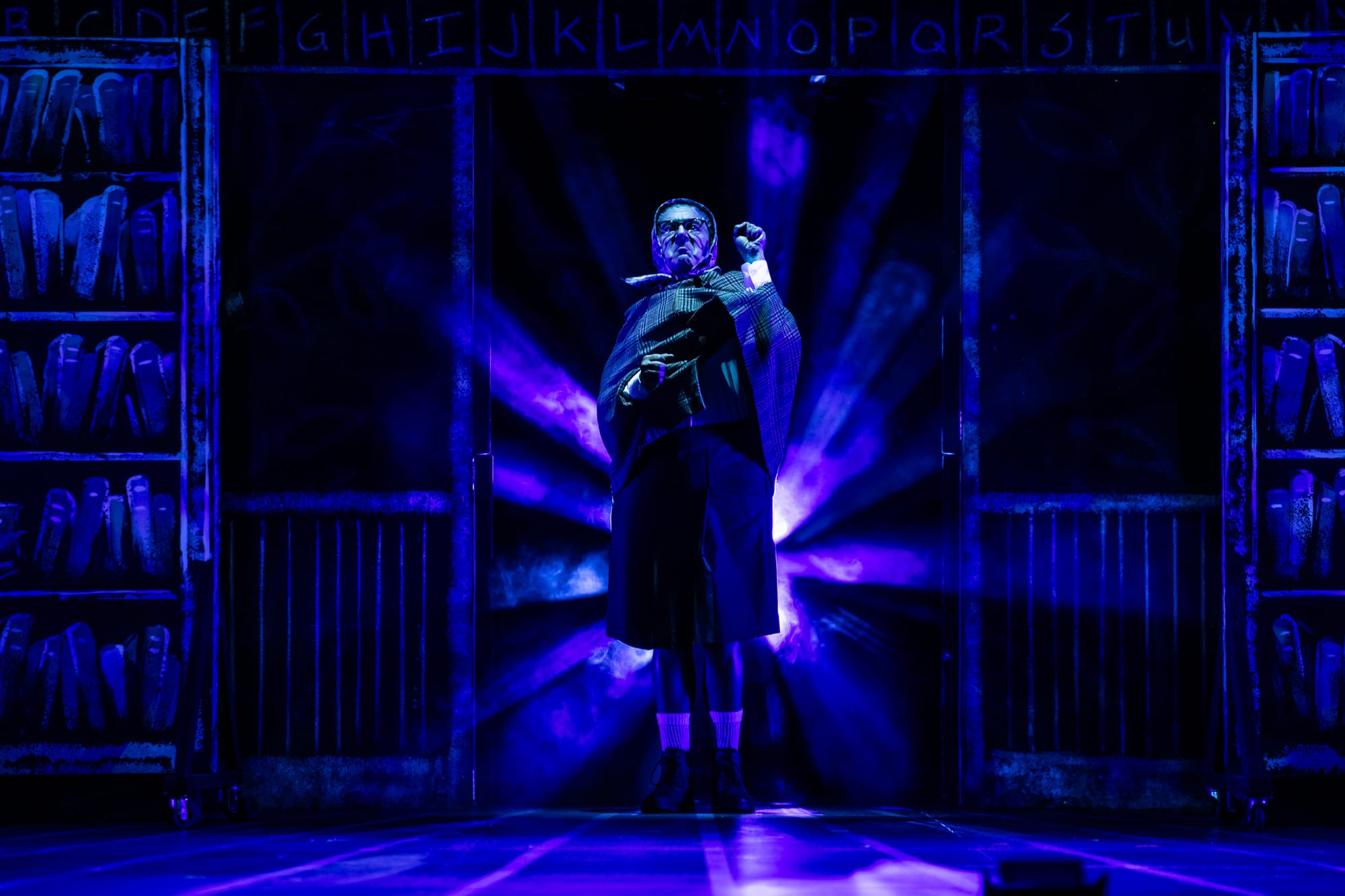
As Miss Trunchbull, David Lowenstein is a "bullhorn with physical prowess to match his razor-sharp verbal gifts." Courtesy photos by Kacy Meinecke
Nora Mae Dixon, as Matilda, perfectly fills the outsized character with her iron-rod posture, penetrating gaze, and clarion speaking and singing voice. Her Matilda is empathetic, likeable, formidable. Dixon also plays well with others, simultaneously standing out as the lead character and sharing the stage in chorus scenes.
As Miss Honey, Kassi McMillan offers a luscious singing voice that lives up to her character’s name: rich, full yet delicate, perfectly tuned, crystal clear. Although the first two opening numbers entertain (with Matilda exclaiming her theme in song with the line “nobody else is gonna tell my story”), McMillan’s “Pathetic” feels like the show’s genuine lift-off point. (Lowenstein then revs it up with “The Hammer” and we are shot to the moon for the remainder of the show.) Physically, McMillan beautifully encapsulates the character, passive without being wimpy, lovely but plain in her own damaged self-regard.
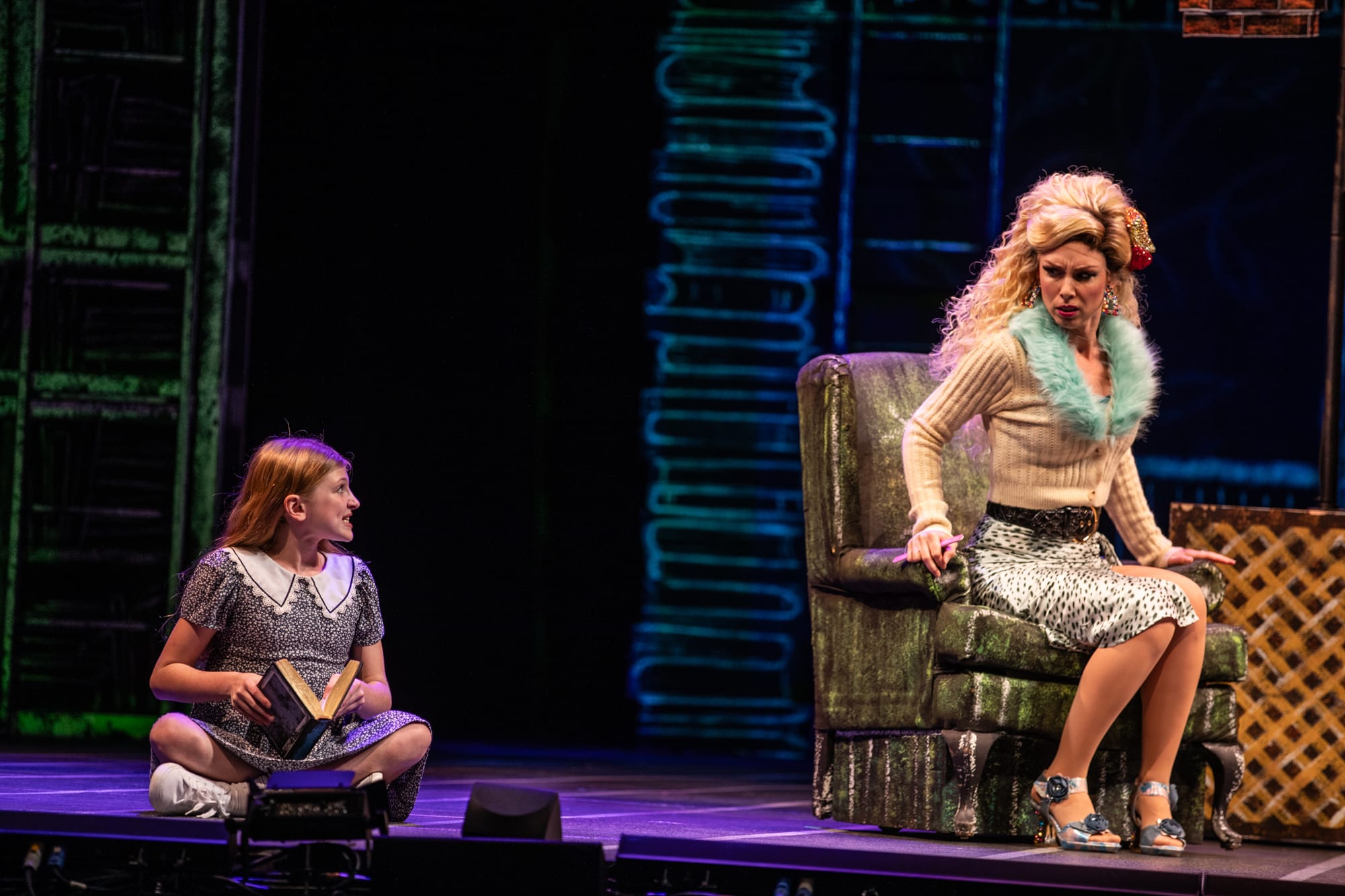
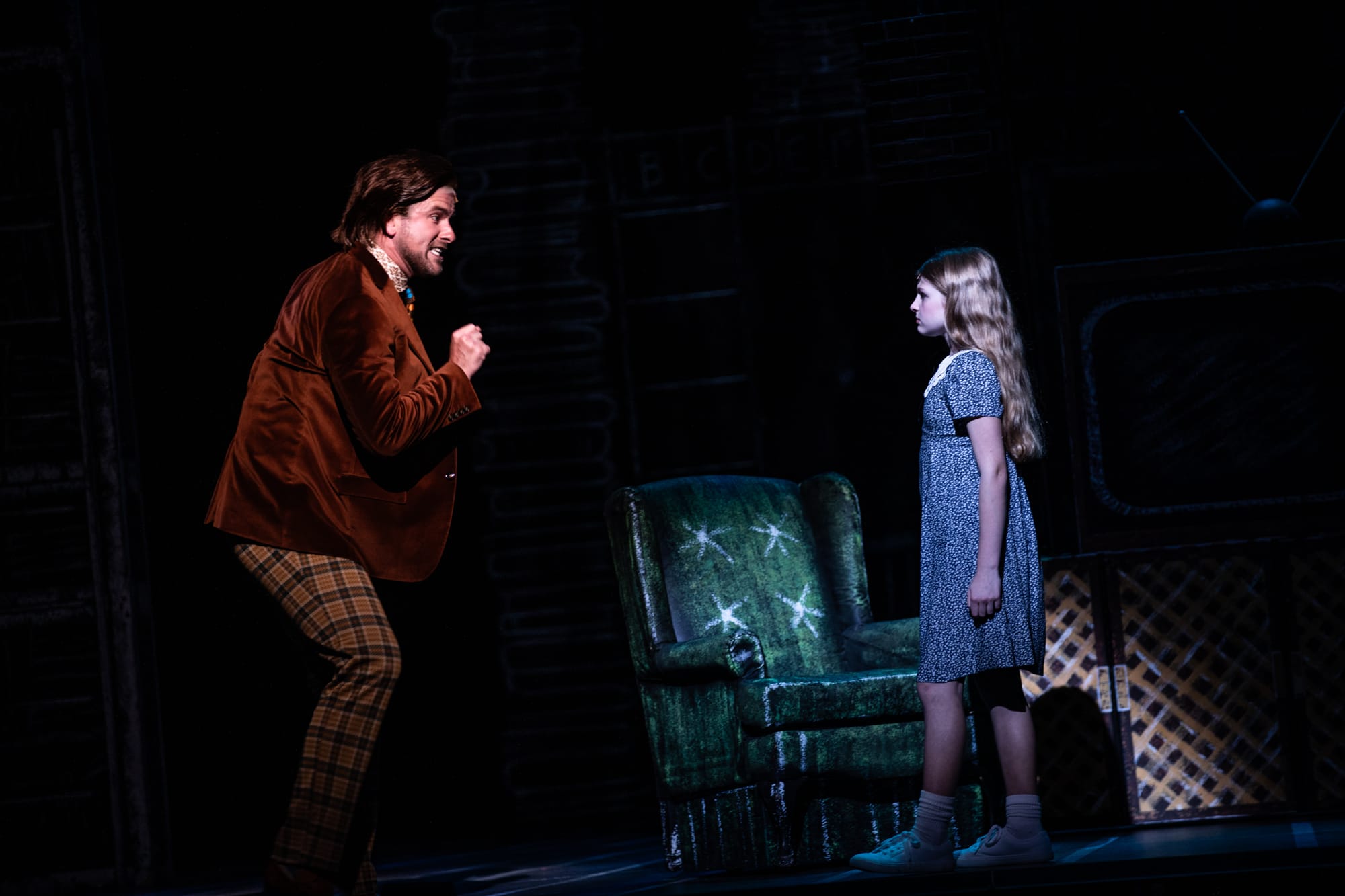
The elder Wormwoods may be terrible parents, but Lauralyn McClelland and Chris Stevens infuse their roles with humanity. Courtesy photos by Kacy Meinecke
Both the Wormwoods are marvelous entertainers—Lauralyn McClelland, most notably in her dancing, which she shares with the skilled Alex Iozzio as her partner, but also as a comedically skilled actor; her Mrs. (neither parent has a given name) is, despite being an awful mother, somehow weirdly likeable. As Mr., Chris Stevens’ comedy is physically and vocally meticulous — like watching a surgeon at work — but he also brings heart to a heartless role. (One of the strange things about this book is the father’s sorta-maybe redemptive moment near the end, which fizzles and dies. McClelland and Dixon handle this scene with panache.)
The exuberant kids roll, jump, play, sing, entertain, and provoke endless giggles throughout. They also perform well the often jaggedly choreographed dances reflecting the ugly world they live in. Director-choreographer Brian J. Marcum’s work is pitch-perfect. Standouts include Blair Baeza as the cheerful Lavender and Barron Dyer and Cole Broddle as the horribly maligned Bruce and Tommy, respectively. Really, though, the whole passel of kids delights.
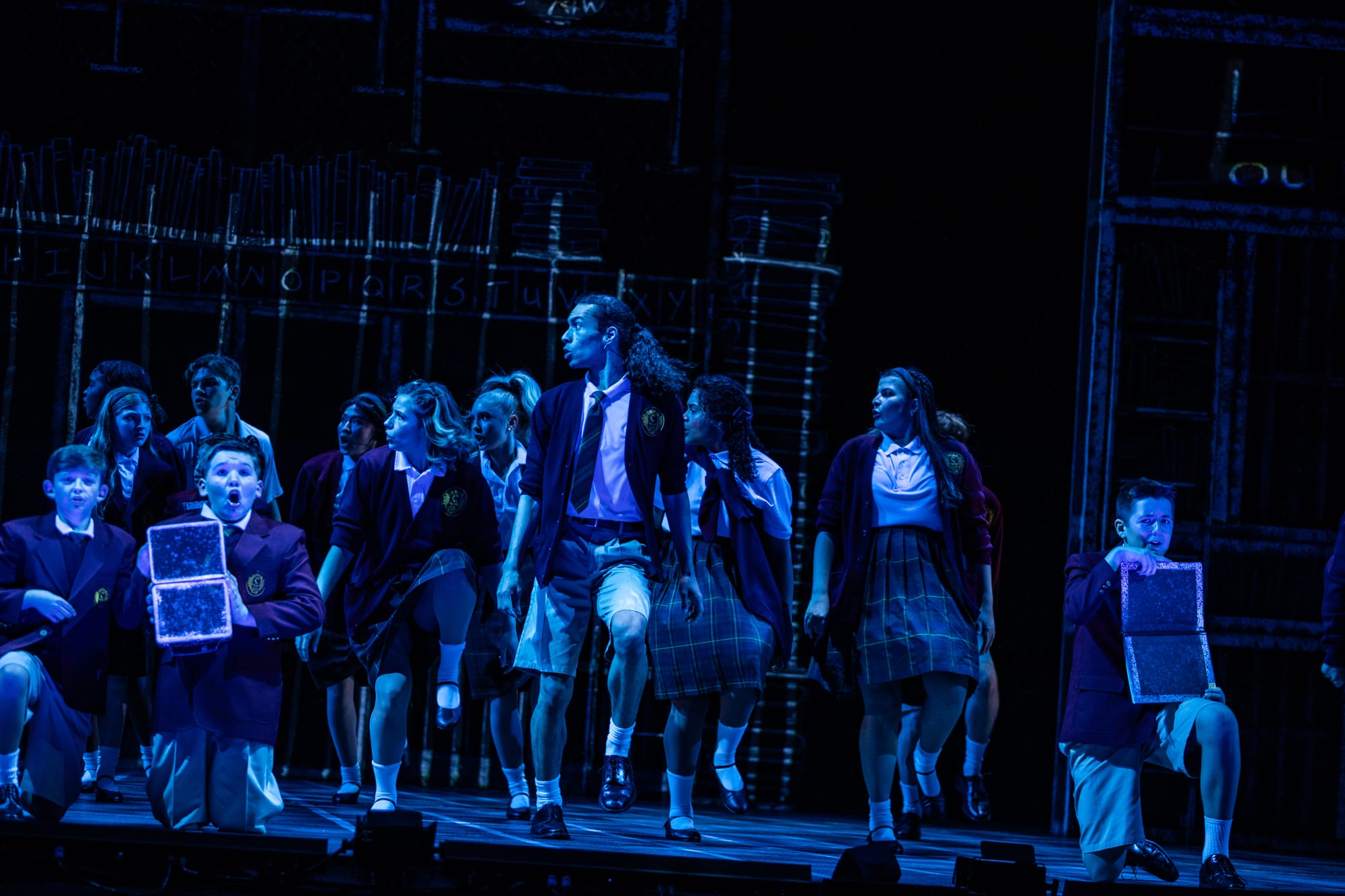
Aria Evans, in a somewhat thankless role as the librarian who listens to Matilda’s stories, radiates slightly goofy goodness. Brayden Worden and Lacey Jack are lovely as the characters in Matilda’s story, and Caleb Sporrer is a solid comedic bad guy near the show’s close. He does his best with an anticlimactic and overly long scene.
The talented orchestra, conducted by Jesse Warkentin, collaborates on the show’s rich but challenging music without overpowering the voices. And Abby Stroot’s costuming well reflects the show’s moods: the qualities of the in-your-face characters (the dancing Mrs. Wormwood’s bright reds), the victimized ones (Miss Honey’s pastels), the vicious ones (Miss Trunchbull’s uniform is so stiff and tight it looks ready to burst), and the oppressed ones (the children’s dark maroon uniforms).
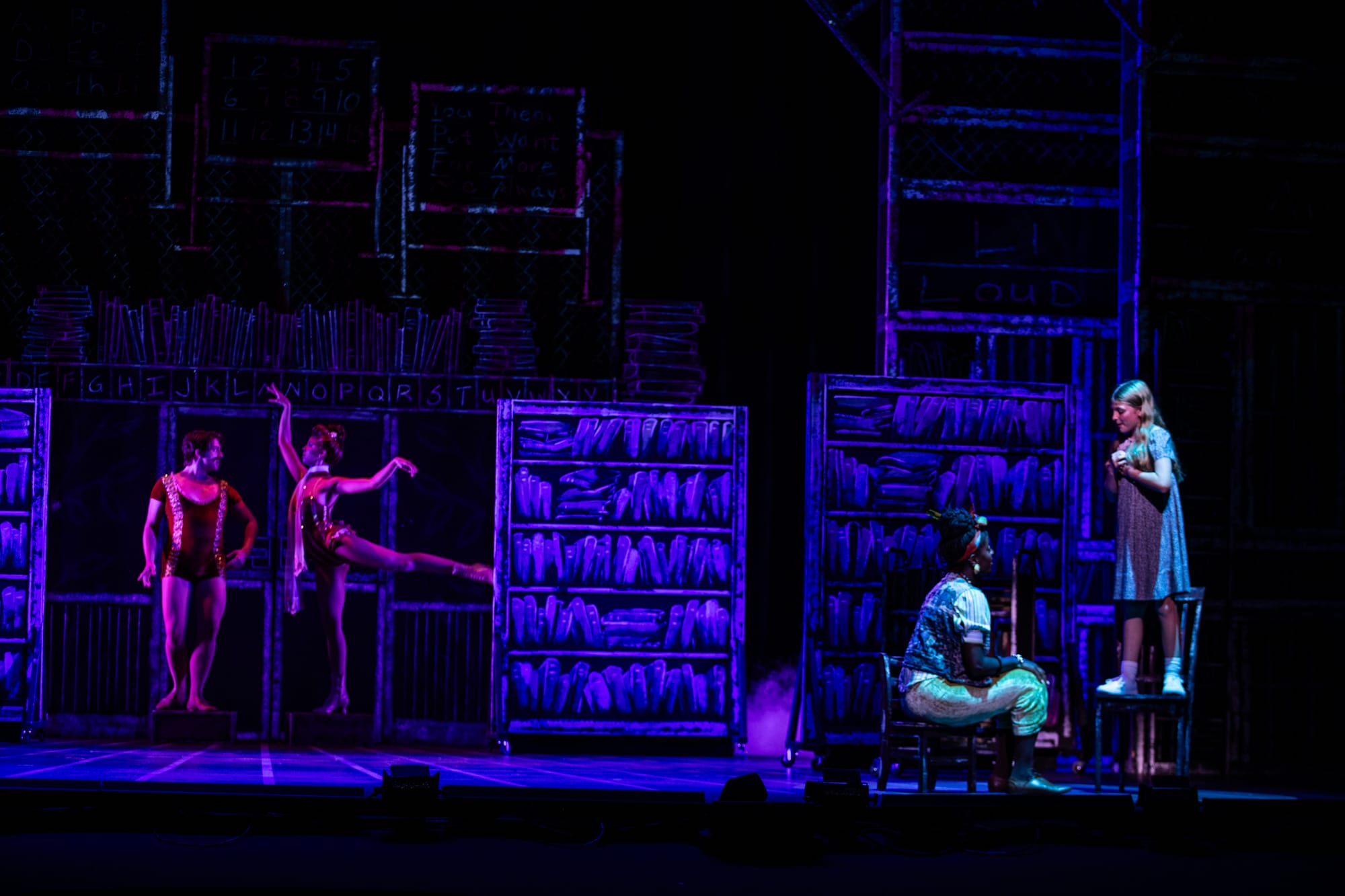
A few issues with mics mar the production somewhat. And the probably wise decision to Americanize the originally British show doesn’t always mesh; there’s something about this show that feels intrinsically English.
But these quibbles shrink alongside this MTW production’s irresistible ebullience, magic, and joy.
The Details
Music Theatre Wichita presents “Matilda”
Multiple performances July 31-August 4 with evening and matinee options, at Century II Concert Hall, 225 W. Douglas Ave. in Wichita
Rated PG for scary moments.
Accessibility note: ASL will be provided during the Sunday matinee performance.
$25-81
Learn more and buy tickets.
Correction: This review was updated on August 2 to reflect that the deus ex machina at the end of "Matilda" is initiated by mobsters who are Bulgarian, not Russian. We regret the error.
Freelance writer Anne Welsbacher writes plays, fiction, nonfiction, and book and theatre reviews.
More theater coverage from the SHOUT
 The SHOUTTeri Mott
The SHOUTTeri Mott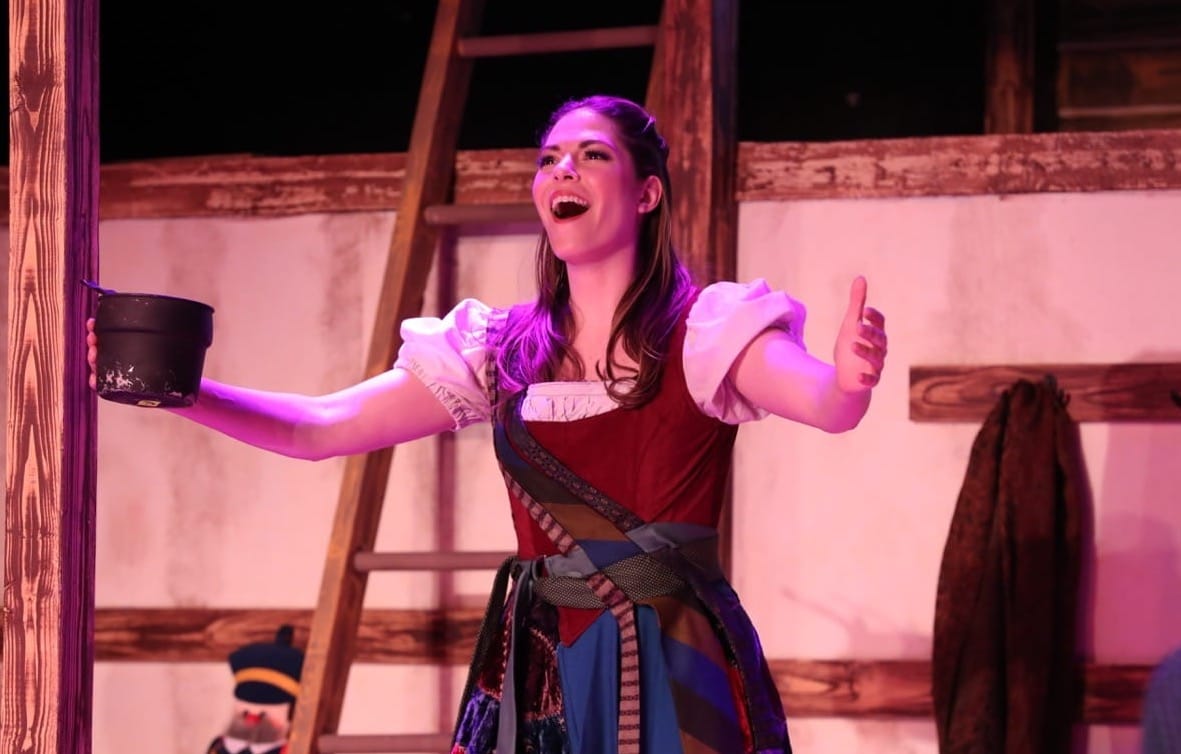
 The SHOUTEmily Christensen
The SHOUTEmily Christensen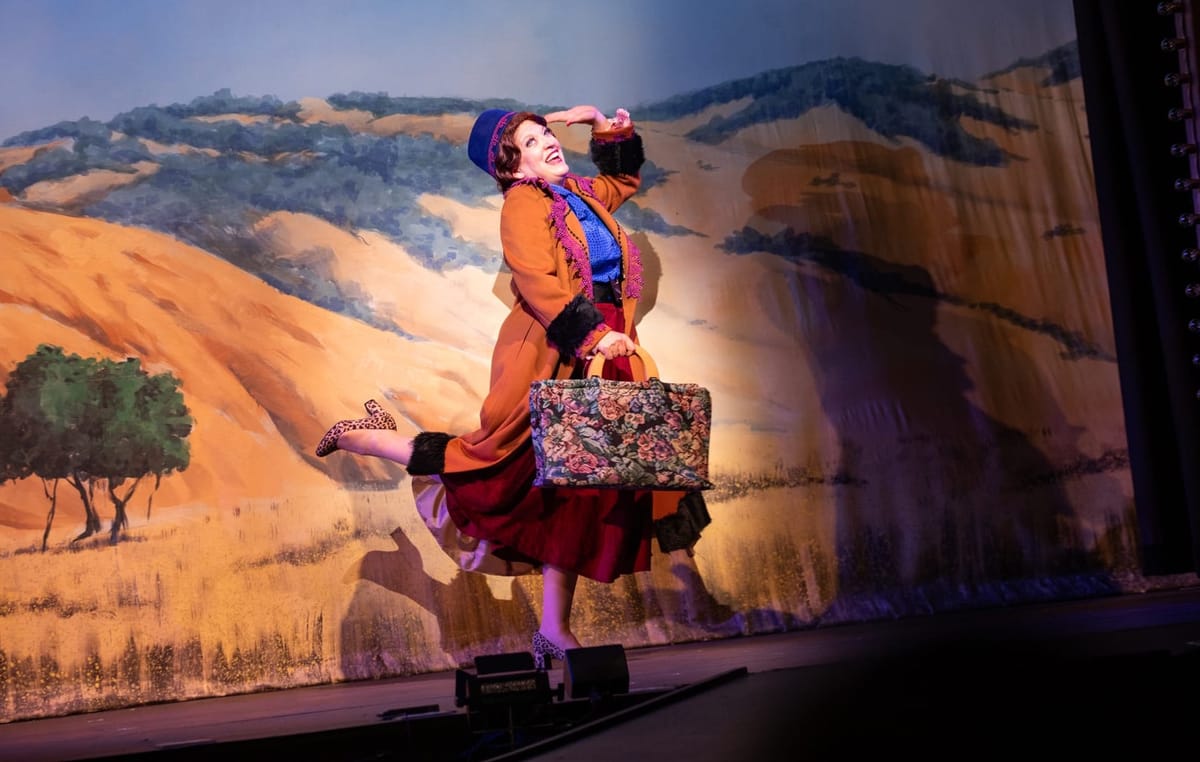
 The SHOUTLeslie Coates
The SHOUTLeslie Coates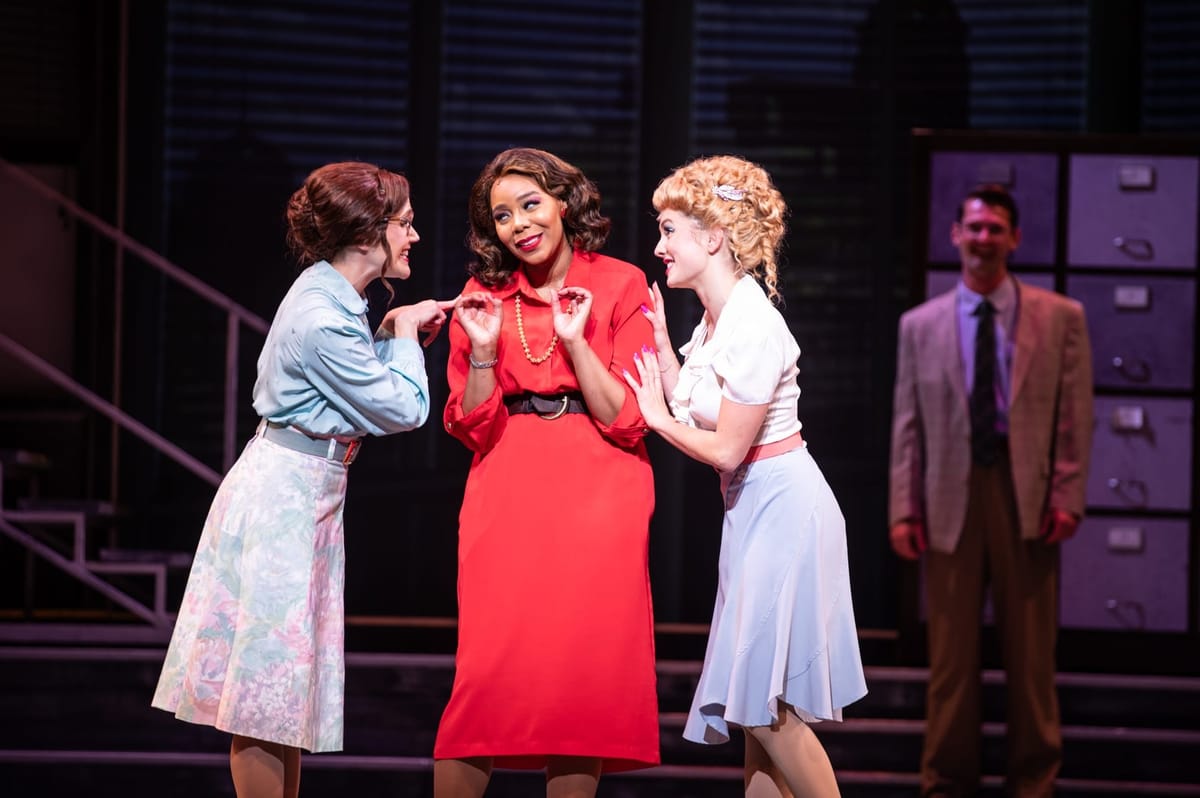
 The SHOUTLori Brack
The SHOUTLori Brack